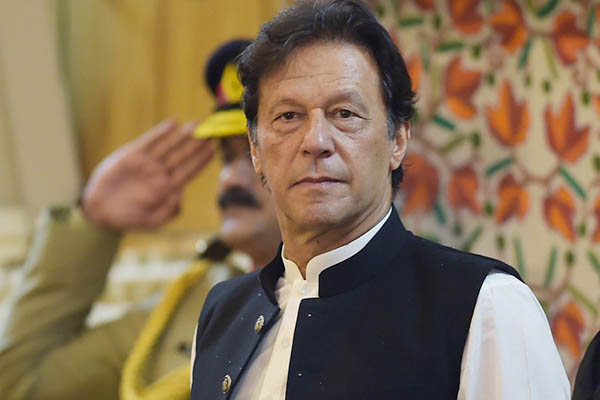
File photo of Prime Minister Imran Khan. Aamir Qureshi—AFP
Prime minister tells German broadcaster any conflict between Iran and Saudi Arabia would be disastrous for Pakistan
Commercial interests are compelling the world to adopt silence over New Delhi’s ongoing atrocities in India-held Kashmir, Prime Minister Imran Khan told a German broadcaster in an interview released on Thursday.
In an exclusive interview with DW’s Editor-in-Chief, Ines Pohl, Khan said it was unfortunate that the international community was paying far less attention to Kashmir than it was to Hong Kong. “The tragedy of Kashmir is much greater,” he said, pointing a finger at the West’s commercial interests for its silence. “India is a big market and that is the reason behind the lukewarm response to what is happening to some 8 million people in Kashmir, as well as to minorities in India,” he said, noting that the Citizenship Amendment Act was blatantly discriminatory against minorities but the world was not paying it any heed.
“Strategically, India is supposed to be a counterbalance to China, and therefore you see a completely different approach to the two conflicts,” he said of Kashmir and Hong Kong.
According to the prime minister, he was the first leader to warn the world about the extremist Hindutva ideology of India’s incumbent leadership, inspired by the Rashtriya Swayamsevak Sangh. “It is a tragedy for India—and for its neighbors—that the country has been taken over by the RSS, an organization which also assassinated the great Mahatma Gandhi. A nuclear-armed country is being run by extremists, and Kashmir has been under siege for over five months,” he said.
Khan said he had been willing to negotiate peace with Indian P.M. Narendra Modi, but said it became quite clear that there would be no reciprocation after New Delhi unilaterally annexed the disputed territory of Kashmir.
“We invite anyone from anywhere in the world to visit the Pakistan side of Kashmir and then go to the Indian side. Let them decide [which is better],” he said to questions about global criticism about curbs on freedom of expression in Pakistan-administered Kashmir. “Let the people of Kashmir decide what they want. Pakistan is ready for a referendum or a plebiscite. Let them decide whether they want to remain with Pakistan or to be independent,” he said.
The prime minister said he felt Germany could play a huge role to help the people of Jammu and Kashmir. “Germany is the strongest country in Europe and plays a big part in the E.U. When I spoke to Chancellor Angela Merkel, I tried to explain these issues to her; about what is happening in India. And she actually made a statement about it when she visited India,” he said.
Khan said Pakistan has great potential but it is located in a very “difficult” neighborhood. “Saudi Arabia is one of Pakistan’s greatest friends and has always been there for us. Then we have Iran, with which we have always maintained a good relationship. Therefore, a military conflict between Saudi Arabia and Iran would be disastrous for Pakistan,” he said, adding that Islamabad was striving to ensure ties between Riyadh and Tehran did not deteriorate as the Middle East cannot afford another conflict.
Of Afghanistan, he said Pakistan is doing its best to bring peace to the war-torn state. “We pray that the Taliban, the Americans and the Afghan government achieve peace,” he said, adding that Islamabad had played its part in the peace talks “with whatever influence we have.” He noted that if peace were achieved in Afghanistan, it would greatly benefit Pakistan as it would open up trade opportunities that are currently lacking.
To a question by Pohl on Khan’s silence over China’s crackdown on Muslim Uighurs in Xinjiang—even as he criticizes India’s discrimination against its Muslim minority—the prime minister said there were two reasons. “First, the scale of what is happening in India is not comparable to what is supposedly happening to the Uighurs in China. Second, China has been our great friend. It has helped us in our most difficult times because of the economic crisis my government inherited. Therefore, we do talk about things with China privately, not publicly, as these are sensitive issues,” he said.
